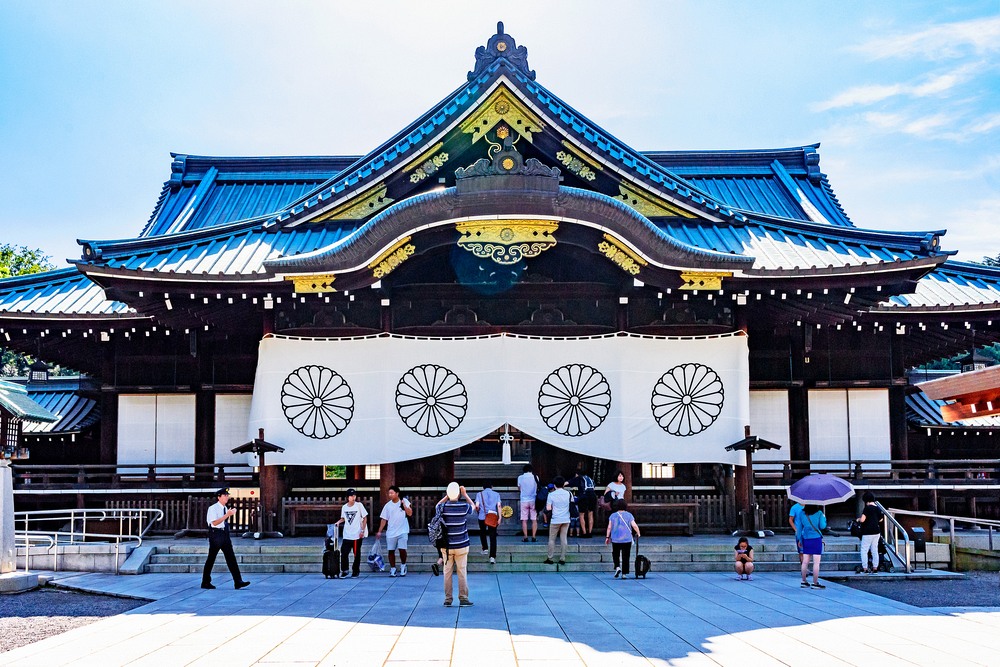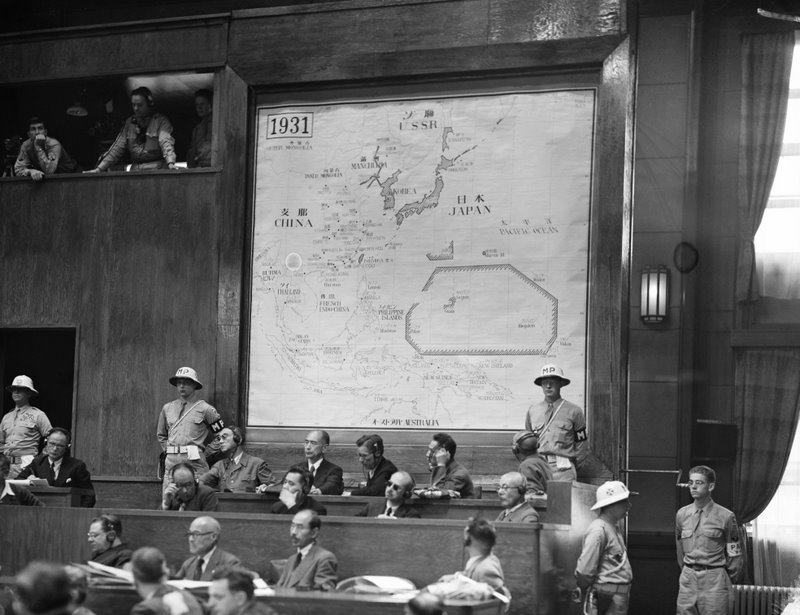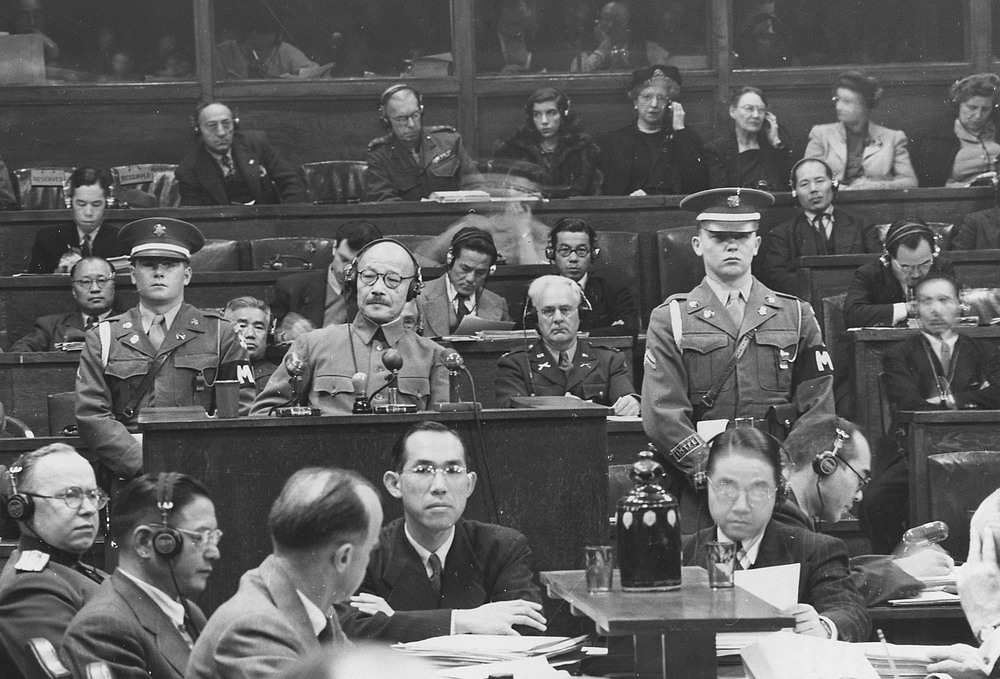
Yasukuni Shrine, Tokyo. Photo credit: Toshihiro Gamo/Flickr
But the shrine is also a very sensitive and controversial place. Among the 2.4 million souls enshrined and revered here, are more than 1,000 war criminals who were tried, convicted and executed by Allied war tribunals, or who died in prison, after the end of the Second World War. These people committed some of the most horrific crimes in human history, including murdering, maiming and starving prisoners of war, forcing them into labor under inhuman condition, plundering public and private property and destroying cities, towns and villages beyond any justification of military necessity. These people perpetrated mass murder on civilians, rape, pillage and torture, and other barbaric cruelties upon the helpless. Who can forget the Rape of Nanking where Japanese soldiers went from door to door collecting women and girls to rape, and then mutilated them after they were done? Or those little games soldiers played trying to outdo each other on who could kill the most with their swords? Elsewhere, in Japanese prison camps, doctors of death carried out inhumane experimentation on prisoners, such as deliberately infecting them with diseases or performing vivisections. Countless young Asian women were forced into **-slavery to entertain the troops. To this day, China and Korea have gone blue in the face trying to extract an official apology out of Japan.
Japan’s unwillingness to contrite and reconcile with the past has been a source of much tension among the Asian countries who were victims of Japan’s aggression and atrocities. Unlike Germany who is full of remorse and apologetic about the holocaust, the Japanese government actively tries to suppress information about the unspeakable horrors perpetrated by the Empire. Most Japanese history textbooks gloss over the controversial parts while others deny them outright. Events like the Nanjing Massacre are mere footnotes, and references about “comfort women” occur nowhere in history textbooks for junior high schools.
Some believe the Nanjing Massacre never happened.
“All of the photographs that China uses as evidence of the massacre are fabricated,” says Nobukatsu Fujioka, a professor of education at Tokyo University, who wrote many history books. “The Chinese government hired actors and actresses, pretending to be the victims when they invited some Japanese journalists to write about them.”
These sentiments are reflected by many right-wing politicians. Nariaki Nakayama, the former education minister, claims that the “comfort women” were professional prostitutes from brothels run by private agencies, and no women were forcibly taken to serve the army.
The Tokyo War Crimes Tribunal of 1946 identified three classes of war criminals. Class A criminals were those who committed a “crime against peace,” by participating in a conspiracy to start and wage war. These charges were filed against Japan's political and military leaders who had planned and directed the war. These were the highest ranking people in the Japanese war machine. Class B criminals were those accused of conventional war crimes such as mistreatment of prisoners, murder of civilians in occupied territory, and wanton destruction of cities. Class C were those criminals charged with “crimes against humanity.” These are the people who carried out widespread or systematic persecution and atrocities against a group of people, including murder, extermination, enslavement, deportation, etc.

Japanese war criminals stand trial before the International Military Tribunal for the Far East, in Tokyo.
In 1952, as soon as the Allied occupation of Japan ended, some groups lobbied for the rehabilitation of Japan’s war criminals and successfully persuaded the Ministry of Justice to issue a memorandum that declared that war criminals were to be treated in the same way as criminals convicted in a Japanese court of law. This restored the civil rights of the criminals. Another amendment to the laws allowed the surviving relatives of war criminals to receive benefits the same way war veterans received. When the last surviving war criminals were paroled in 1958, the possibility of enshrining the executed criminals at Yasukuni began to appear feasible.
From 1959 to 1967, a total of 984 Class B and Class C war criminals were enshrined at Yasukuni. The authorities did not even seek permission from the surviving family members, some of who opposed the enshrinement. In 1966, the first batch of names belonging to Class A was forwarded to the shrine, but the head priest, Tsukuba Fujimaro, kept delaying the enshrinement until his death in 1978. His successor, Matsudaira Nagayoshi, thought differently. Matsudaira believed the Tokyo Trials had painted a very different picture of Japan casting the island nation as the sole villain. Rejecting the verdict of the tribunal, Matsudaira decided to enshrine Japan’s Class A war criminals at Yasukuni. But being aware of how the world would react when they found out, Matsudaira conducted a secret ceremony and enshrined fourteen Class A criminals.

Hideki Tojo, the former General of Imperial Japanese Army and War Minister, testifying at the International Tribunal trials, Tokyo.
When word got out the following year, Emperor Hirohito refused to enter the shrine. Since that time, no Emperor of Japan has visited Yasukuni. But a succession of Japanese prime ministers have continued to visit the shrine paying respect to the dead angering many of the former Allied nations, especially China and South Korea, who suffered the worst of the Japanese atrocities. Some demonstration have turned violent. In 2001, in protest against the visit by Japanese Prime Minister Junichiro Koizumi, twenty South Korean men chopped off the tips of their little fingers. In 2011, a Chinese man attempted to burn down a gate column at Yasukuni and was arrested. In 2015, a South Korean man blew up a restroom inside the shrine. Any foreign national who visited the shrine have drawn ire from the public. In 2014, Canadian singer Justin Bieber posted pictures of him visiting the shrine in social media provoking angry outbursts. He later took down the photos and offered an apology.
“Regrettably, it is a reality that the visit to Yasukuni Shrine has become a political and diplomatic issue,” said Japanese Prime Minister Abe, shortly after his 2013 visit. “Some people criticize the visit to Yasukuni as paying homage to war criminals, but the purpose of my visit today, on the anniversary of my administration’s taking office, is to report before the souls of the war dead how my administration has worked for one year and to renew the pledge that Japan must never wage a war again.”
The Yasukuni Shrine continues to be a thorn in the relationship between Japan and its neighboring countries.
“The high-level patronage (by the Japanese) to Yasukuni Shrine continues to burden Japan’s relations,” observes Giuseppe A. Stavale, who wrote a long essay on the subject. “Inaccurate or incomplete versions of history in Japanese school text books which has the tendency of depicting Japan as a victim in World War II, and among other things visits by high-ranking Japanese elected officials, specifically the prime minister, to the Yasukuni Shrine as proof that Japan still has not changed and therefore still poses a threat to peace and stability in the region.”

Top row, left to right:Hideki Tojo (Chief of the Imperial Japanese Army and Prime Minister during the war period. Found guilt of unprovoked war and ordering, authorizing and permitting inhumane treatment of prisoners of war); Kenji Doihara (General in the Imperial Japanese Army. Played a key role in the Japanese occupation of large parts of China and the destabilization of the country); Iwane Matsui (General in the Imperial Japanese Army. Ordered the capture of the city of Nanjing); Heitarō Kimura (General in the Imperial Japanese Army. Found guilty of war crimes committed in China and Southeast Asia, and was put responsible for preventing atrocities against prisoners of war in Burma).
Bottom row, left to right: Kōki Hirota (Diplomat and foreign minister, and the only civilian to be executed of war crimes. Hirota was accused of waging wars of aggression and disregard for duty to prevent breaches of the laws of war); Akira Mutō (General in the Imperial Japanese Army. Mastermind behind the Second Sino-Japanese War. He was charged with leading troops during the worst excesses of the Nanjing Massacre); Seishirō Itagaki (General in the Imperial Japanese Army. Helped plan the 1931 Mukden Incident, which was used to justify increased military operations in China).

 عرض نسخة صالحة للطباعة
عرض نسخة صالحة للطباعة أرسل هذا الموضوع إلى صديق
أرسل هذا الموضوع إلى صديق